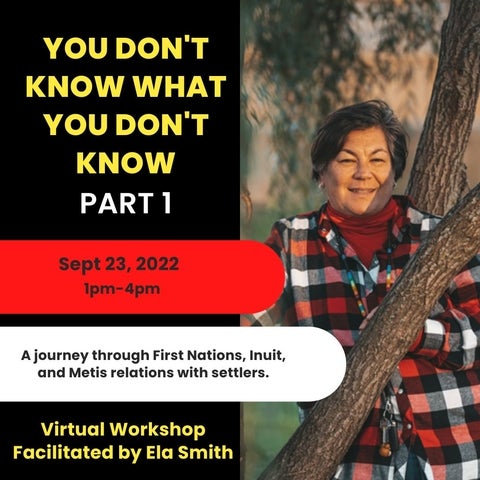
About the Facilitator
Aanii, My name is Gee waniway eekwe (Whirling wind woman). I am bear clan displaced through colonization. I am a graduate of the Early Childhood Education Diploma program, Bachelor of Arts Degree and a Master of Social Work, Indigenous Field of Study. Much of my career has focused on working within mental health and advocacy. I have worked as Executive Director at White Owl Native Ancestry, Program Director at Ontario Federation of Indigenous Friendship Centers, as well as an Indigenous Curriculum Development Specialist. I work from a wholistic trauma-informed pedagogical perspective that works to empower people to critically reflect on how their practice impacts the world. I currently sit on the Ontario Association of Children’s Aid Societies Board of Governors as chair impacting change from a provincial focus for First Nations, Metis, and Inuit children and families within child welfare.
You Don't Know What You Don't Know Pt.1
This is a two-part workshop that journeys through First Nations, Inuit, and Metis relations with settlers. As the title indicates, you don't know, what you don't know so everyone is welcome. You will be introduced to the concept of Miskasowin (wholistic self-evaluation) that will define content, context, and relationship promoting further action, accountability, and responsibilities as a treaty person in this land now known as Canada. This is an online, 3-hour workshop, in a small-group setting.
Learning Objectives:
- Deconstruct language and discuss why identity and labels are different for First Nations, Inuit, and Metis peoples.
- Unlearning historic and current realities forFirst Nations, Metis and Inuit peoples in the land now known as Canada and how the resulting cultural genocide:
- Affects current and future generations of First Nations, Inuit, and Metis peoples
- Affects how First Nations, Inuit, and Metis peoples are received andtreated in institutions, including post-secondary institution
- Increase understanding ofIndigenous ways of knowing
- Increase awareness of local urban First Nations, Metis, and Inuit communities
- Promote self-reflection to further an understanding of the impacts of colonization, racism, and implicit bias experienced by First Nations, Inuit, and Metis peoples
Availibility is limited. Register here: https://bit.ly/ydkwydkp1
(click on Office of Indigenous Relations)